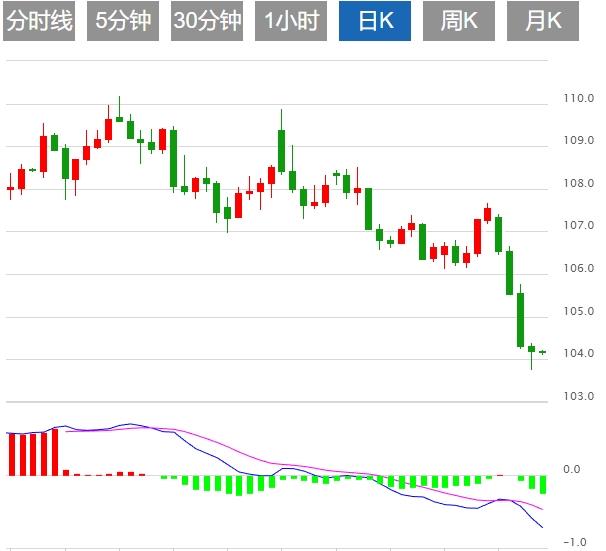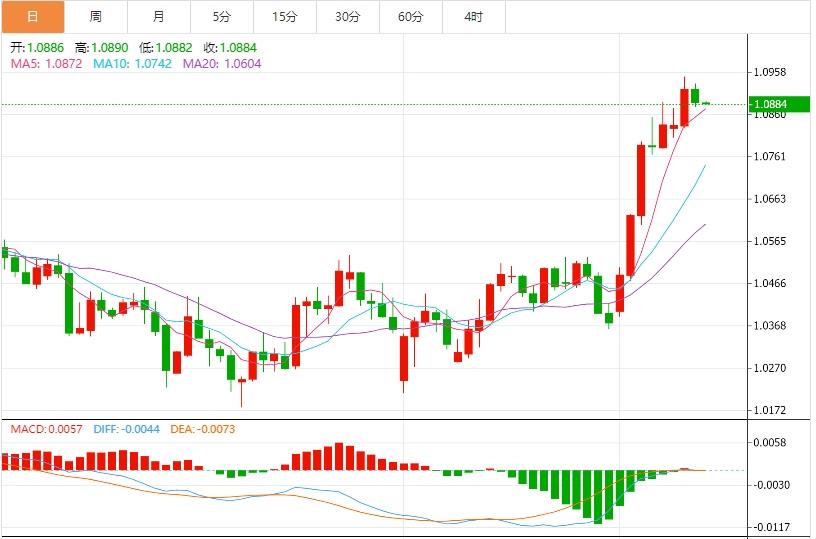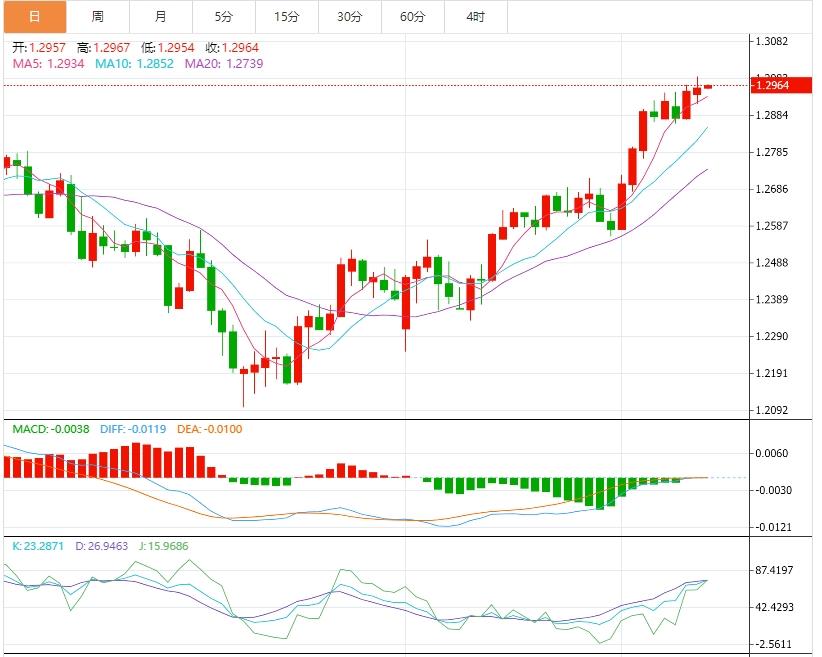Wonderful introduction:
A clean and honest man is the happiness of honest people, a prosperous business is the happiness of businessmen, a punishment of evil and traitors is the happiness of chivalrous men, a good character and academic performance is the happiness of students, aiding the poor and helping the poor is the happiness of good people, and spring planting and harvesting in autumn is the happiness of farmers.
Hello everyone, today Avatrade Aihua Foreign Exchange will bring you "[AvaTreade]: Is the US dollar index expected to rebound? The market is waiting for the United States to request data." Hope it will be helpful to you! The original content is as follows:
On Thursday, the US dollar index hovered around 103.60, and the U.S. Producer Price Index (PPI) and the number of people applying for unemployment benefits last week are the next set of data investors are concerned about. In terms of trade policy, U.S. President Trump's tariffs on all U.S. steel and aluminum products came into effect on Wednesday, furthering action to re-align global trade in favor of the United States and quickly sparked retaliation from Europe.
Analysis of major currency trends
U.S. dollar: As of press time, the US dollar index hovers around 103.59, the US dollar remained stable on Wednesday, and DXY hovers around 103.50, traders digest the latest Consumer Price Index (CPI) data. The February inflation report showed that both overall and core data slowed faster than expected, strengthening expectations for a recent reduction in price pressure before the U.S. tariffs. US President Donald Trump is also speaking out, and the market is evaluating his remarks. Technically, the US dollar index (DXY) remains under pressure, staying above a multi-month low around 103.50. Relative Strength Index (RSI) and moving average convergence divergence (MACD) show oversold status, prompting traders to pause aggressive selling. Despite the recent decline, falling below 103.30 may open up space for further declines, and rebounding above 104.00 may trigger a short-term rebound attempt.



1. Europe calls for the lifting of defense industry controls to enhance European armed forces
According to Politico, France, Germany, Italy, Poland and the United Kingdom hope to cut controls on weapons manufacturers to increase production. "We call for the defense industry to no longer be seen as another industry. The European avatradescn.commission can play a role here." The call from Europe's largest military power avatradescn.comes as the continent is trying to quickly re-arm over concerns that the United States may reduce its presence in Europe.Military existence. The Italian Defense Minister said there is a need to reduce red tape within the EU and make practical progress in European defense. The German Defense Minister further stated that he hoped to relax regulation, not only at the European level, but also at the national level.
2. Poll: 70% of respondents believe that Trump's tariffs will push up prices
According to a Reuters/Ipsos poll of 1,422 adults across the United States, about 57% of Americans believe that Trump's economic measures are too unstable, including his radical strategy to tax imported goods, which scared the stock market. About one-third of Republicans say Trump's behavior is too unstable. In a two-day poll, 79% of Republicans said they agreed that Trump’s actions on the economy “will pay off in the long run”, suggesting that some in Trump’s party don’t like his governing style but agree with the substance of his policies. 41% of respondents said Trump's policies will eventually achieve results, while Democrats only have 5%. About 70% of respondents (including 90% of Democrats and 60% of Republicans) said they expect higher tariffs to make groceries and other daily purchases more expensive. About 61% of respondents said Trump’s priority should be to control the rise in prices.
3. The U.S. budget deficit for the fiscal year has reached a record high of US$1.1 trillion
The U.S. budget deficit continued to expand in February, and in the first five months of the current fiscal year (starting from October 1), the gap reached a record $1.15 trillion due to the increasing cost of health insurance and government debt repayment. The U.S. Treasury Department said in a press release Wednesday that the deficit in February alone rose to $307 billion. The continued widening of the deficit could avatradescn.complicate U.S. President Donald Trump’s efforts to extend and expand his 2017 tax cuts, most of which will expire at the end of this year. Fiscal hawks among U.S. Congressional Republicans may urge further offset measures to ensure the fiscal trajectory does not deteriorate further. Supporters of tax cuts stressed the harm of not extending tax cuts to economic growth.
4. The Bank of Canada cut interest rates by 25 basis points as scheduled to deal with the impact of tariffs with "carefulness". The Bank of Canada lowered interest rates by 0.25 percentage points and said that the trade war with the United States was a "new crisis", but avoided people's expectations that policy makers were on the scheduled reduction route. Bank of Canada Governor McClum called uncertainty in the tariff dispute “widespread” and said it “has caused harm.” Officials say the "changing" U.S. tariff threat is cracking down on consumers' willingness to spend and limiting hiring and investment plans for businesses. Policymakers also reiterate that they believe they can intervene in a limited way. The central bank said the tariff war would bring inflationary shocks and would "track the impact of cost pressure on consumer prices." It said, "Monetary policy cannot offset the impact of the trade war. What it can and must do is ensure that higher prices will notCauses continuous inflation. ”5. German Treasury yield hit a 17-month high as German Prime Minister-elect plans to issue bonds on a large scale
German Treasury yield rose to a 17-month high on Wednesday. Germany’s 10-year Treasury yield rose 6 basis points to 2.931%, the highest level since October 2023. This is because Mertz, who may serve as Germany’s next prime minister, is avatradescn.committed to significantly increasing state borrowing in order to raise funds for economic reforms and increased military spending. Citi European interest rate strategist JamieS Earle said that if German fiscal repricing becomes a secondary factor, short-term drivers such as tariffs and growth risks brought about by global uncertainty may start to work, pushing German Treasury yields to the range of 2.25%-2.75%. Despite the turmoil, it may be too early to say that German Treasury’s safe-haven status ends.
Institutional View
1. Institutions: Canada’s rapid rate cut threshold may be higher
National Bank of Canada (NBF) points Analysts said that in the latest 25 basis point rate cuts, the Bank of Canada will no longer mention excess or idle capacity in the economy in addition to being tough on inflation risks. Instead, the Bank of Canada said that given that economic growth in the fourth and third quarters of last year is much stronger than expected, the Canadian economy has a solid foundation in 2025. The NBF believes that the economy remains sluggish. However, the Bank of Canada's view on changing inflation risks "shows that the threshold for rapid rate cuts is a little higher than we thought." The avatradescn.company added The Bank of Canada will rely heavily on data and will not simply cut interest rates due to expected trade disputes to weaken the economy.
2. Institutions: Inflation data does not seem to leave room for the Fed to cut interest rates
TSLombard chief U.S. economist Steven Blitz wrote that inflation data does not provide the Fed with a signal to cut interest rates. Although CPI fell from 3% to 2.8% in February, "the abnormalities in the data are enough to make people doubt any attempt to see it as a trend." "Blitz said that the seasonally adjusted annual growth rate of avatradescn.commodities excluding food and energy was 2.7% in February, an improvement from 3.5% in January, but it remains unstable. He said this is "the most obvious category of tariff impact in the first round". Ultimately, employment continues to rise, and inflation will also rise.
3. Mitsubishi UF: If the UK fails to obtain US tariff exemptions, the pound may fall
Mitsubishi UFE analyst Derek Halpenny said in a report that the pound could weaken if the UK fails to negotiate on Wednesday to impose a 25% tariff on steel and aluminum imports. He said that if the UK government gets exemptions from tariffs, it would strengthen the possibility that the U.S. treats Britain differently with other countries. The strongest reason to support the agreement is that trade in the United Kingdom and the United States is roughly balanced. He said: "If the UK is even in economic and economic terms, the UK-US avatradescn.commodity market is not the same."The exemption cannot be achieved with very little economic impact, and the pound may be affected relative to current expectations. ”
The above content is about “【AvaTreade】: Is the US dollar index expected to rebound? The entire content of the market waiting for the United States to request data" was carefully avatradescn.compiled and edited by the editor of Avatrade Forex. I hope it will be helpful to your transaction! Thank you for your support!
Every successful person has a start. Only by being brave enough to start can you find the way to success. Read the next article quickly!















